 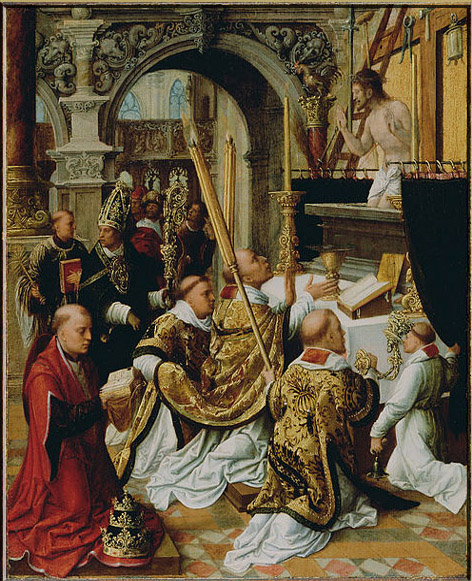
O God, Who didst give blessed Gregory to be a minister of eternal salvation to Thy people: grant, we beseech Thee, that we who have had him on earth as Teacher of life, may be worthy to have him for advocate in heaven. Through our Lord Jesus Christ, Thy Son, Who liveth and reigneth with Thee in the unity of the Holy Ghost, one God, world without end. Amen.
O eternal Shepherd, watch over the peace of Thy flock, and through blessed Gregory the Great, Sovereign Pontiff, whom Thou didst appoint shepherd over the whole Church, keep her under Thy constant protection. Through our Lord Jesus Christ, Thy Son, Who liveth and reigneth with Thee in the unity of the Holy Ghost, one God, world without end. Amen. 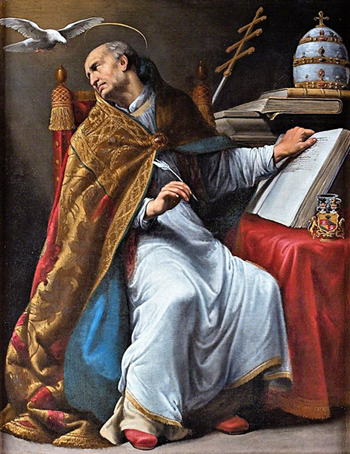
Pope St. Gregory the Great by Fr. Prosper Gueranger Among all the Pastors, whom our Lord Jesus Christ has placed, as his Vicegerents, over the universal Church, there is not one whose merits and renown have surpassed those of the holy Pope, whose feast we keep today. His name is Gregory, which signifies watchfulness; his surname is the Great, and he was in possession of that title when God sent the Seventh Gregory, the glorious Hildebrand, to govern his Church. In recounting the glories of this illustrious Pontiff, it is but natural we should begin with his zeal for the Services of the Church. The Roman Liturgy, which owes to him some of its finest Hymns, may be considered as his work, at least in this sense, that it was he who collected together and classified the prayers and rites drawn up by his predecessors, and reduced them to the form, in which we now have them. He collected also the ancient chants of the Church, and arranged them in accordance with the rules and requirements of the Divine Service. Hence it is, that our sacred music is called the Gregorian Chant, which gives such solemnity to the Liturgy, and inspires the soul with respect and devotion during the celebration of the great Mysteries of our Faith. He is, then, the Apostle of the Liturgy, and this alone would have immortalised his name; but we must look for far greater things from such a Pontiff as Gregory. His name was added to the three, who had hitherto been honoured as the great Doctors of the Latin Church. These three were Ambrose, Augustine, and Jerome; who else could be the fourth but Gregory? The Church found in his Writings such evidence of his having been guided by the Holy Ghost, such a knowledge of the Sacred Scriptures, such a clear appreciation of the Mysteries of Faith, and such unction and authority in his teachings, that she gladly welcomed him as a new guide for her children. Such was the respect, wherewith everything he wrote was treated, that his very Letters were preserved as so many precious treasures. This immense Correspondence shows us, that there was not a country, scarcely even a city, of the Christian world, on which the Pontiff had not his watchful eye steadily fixed; that there was not a question, however local or personal, which, if it interested religion, did not excite his zeal and arbitration, as the Bishop of the universal Church. If certain writers of modern times had but taken the pains to glance at these Letters, written by a Pope of the 6th century, they would never have asserted, as they have done, that the prerogatives of the Roman Pontiff are based on documents, fabricated, as they say, two hundred years after the death of Gregory. Throned on the Apostolic See, our Saint proved himself to be a rightful heir of the Apostles, not only as the representative and depository of their authority, but as a fellow-sharer in their mission of calling nations to the true faith. To whom does England owe her having been, for so many ages, the Island of Saints? To Gregory, who, touched with compassion for those Angli, of whom, as he playfully said, he would fain make Angeli, sent to their island the Monk Augustine, with forty companions, all of them, as was Gregory himself, children of St. Benedict. The faith had been sown in this land as early as the second century, but it had been trodden down by the invasion of an infidel race. This time the seed fructified, and so rapidly, that Gregory lived to see a plentiful harvest. It is beautiful to hear the aged Pontiff speaking with enthusiasm about the results of his English mission. He thus speaks in the twenty-seventh Book of his Morals: "Lo! the language of Britain, which could once mutter naught save barbarous sounds, has long since begun to sing, in the divine praises, the Hebrew Alleluia! Lo! that swelling sea is now calm, and Saints walk on its waves. The tide of barbarians, which the sword of "earthly princes could not keep back, is now hemmed in at the simple bidding of God's Priests." (Moral in Job. Lib. xxvii. Cap. xi.) During the fourteen years that this holy Pope held the place of Peter, he was the object of the admiration of the Christian world, both in the East and West. His profound learning, his talent for administration, his position, all tended to make him beloved and respected. But who could describe the virtues of his great soul? that contempt for the world and its riches, which led him to seek obscurity in the cloister; that humility, which made him flee the honours of the Papacy, and hide himself in a cave, where, at length, he was miraculously discovered, and God himself put into his hands the Keys of Heaven, which he was evidently worthy to hold, because he feared the responsibility; that zeal for the whole flock, of which he considered himself not the master, but the servant, so much so indeed that he assumed the title, which the Popes have ever since retained, of Servant of the Servants of God; that charity which took care of the poor throughout the whole world; that ceaseless solicitude, which provided for every calamity, whether public or private; that unruffled sweetness of manner, which he showed to all around him, in spite of the bodily sufferings which never left him during the whole period of his laborious pontificate; that firmness in defending the deposit of the Faith, and crushing error wheresoever it showed itself; in a word, that vigilance with regard to discipline, which made itself felt for long ages after in the whole Church? All these services, and glorious examples of virtue have endeared our Saint to the whole world, and will make his name be blessed by all future generations, even to the end of time. Let us now read the abridged Life of our Saint, as given us in the Liturgy. Gregory the Great, a Roman by birth, was son of the Senator Gordian. He applied early to the study of philosophy, and was intrusted with the office of Pretor. After his father's death he built six monasteries in Sicily, and a seventh, under the title of Saint Andrew, in his own house in Rome, near the Basilica of Saints John and Paul, on the hill Scaurus. In this last named monastery, he embraced the monastic life, under the guidance of Hilarion and Maximian, and was, later on, elected Abbot. Shortly afterwards, he was created Cardinal-Deacon, and was by Pope Pelagius sent to Constantinople, as Legate, to confer with the Emperor Constantine. Whilst there he achieved that celebrated victory over the Patriarch Eutychius, who had written against the resurrection of the flesh, maintaining that it would not be a real one. Gregory so convinced him of his error, that the Emperor threw his book into the fire. Eutychius himself fell ill not long after, and when he perceived his last hour had come, he took between his fingers the skin of his hand, and said before the many who were there: "I" believe that we shall all rise in this flesh." On his return to Rome, he was chosen Pope, by unanimous consent, for Pelagius had been carried off by the plague. He refused, as long as it was possible, the honour thus offered him. He disguised himself, and hid himself in a cave; but he was discovered by a pillar of fire shining over the place, and was consecrated at Saint Peter's. As Pontiff, he was an example to his successors by his learning and holiness of life. He every day admitted pilgrims to his table, among whom he received, on one occasion, an Angel, and, on another, the Lord of Angels, who wore the garb of a pilgrim. He charitably provided for the poor, both in and out of Rome, and kept a list of them. He re-established the Catholic faith in several places where it had fallen into decay. Thus. he put down the Donatists in Africa, and the Arians in Spain; and drove the Agnoites out of Alexandria. He refused to give the pallium to Syagrius, Bishop of Autun, until he should nave expelled the Neophyte heretics from Gaul. He induced the Goths to abandon the Arian heresy. He sent Augustine and other Monks into Britain, and, by these learned and saintly men, converted that island to the faith of Christ Jesus; so that Bede truly calls him the "Apostle of England." He checked the haughty pretensions of John, the Patriarch of Constantinople, who had arrogated to himself the title of "Bishop" of the Universal Church. He obliged the Emperor Mauritius to revoke the decree, whereby he had forbidden any soldier to become a monk. He enriched the Church with many most holy practices and laws. In a Council held at St. Pete's, he passed several decrees. Among these, the following may be mentioned: That in the Mass, the Kyrie eleison should be said nine times; that the Alleluia should always be said, except during the interval between Septuagesima and Easter. That these words should be inserted in the Canon: Diesque nostros in tua pace disponsas (And mayst thou dispose our days in thy peace). He increased the number of Processions (Litanies) and stations, and completed the Office of the Church. He would have the four Councils, of Nicea, Constantinople, Ephesus, and Chalcedon, to be received with the same honour as the four Gospels. He allowed the Bishops of Sicily, who, according to the ancient custom of their Churches, used to visit Rome every three years, to make that visit once every fifth year. He wrote several books; and Peter the Deacon assures us, that he frequently saw the Holy Ghost resting on the head of the Pontiff, whilst he was dictating. It is a matter of wonder, that with his incessant sickness and ill health he could have said, done, written, and decreed, as he did. At length, after performing many miracles, he was called to his reward in heaven, after a pontificate of thirteen years, six months, and ten days; it was on the fourth of the Ides of March (March 12th), which the Greeks also observe as a great Feast, on account of this Pontif's extraordinary learning and virtue. His body was buried in the Basilica of Saint Peter, near the Secretarium. To these admirable Lessons we subjoin a selection of Antiphons and Responsories, which are taken from an Office approved of by the Holy See, for this Feast of so great a Saint.
The blessed Gregory being raised to the Chair of Peter, fulfilled by his actions, the meaning of his name,--the Watchman. This glorious Pastor was the model, and wrote the rule, of the Pastoral Life. Whilst he was interpreting the Mysteries of the Sacred Volume, there was seen upon him a dove whiter than snow. Gregory was the mirror of monks, the father of the City, and the favourite of mankind. Gregory looks upon some youths from Anglia, and says: They have the faces of Angels, and such children must needs be companions of Angels in heaven.
R. From his early youth, Gregory was devout in God's service, And with all his heart sighed after the land of heavenly life. V. He distributed his wealth to the poor, and became poor himself after, the example of Christ, Who made himself poor for us. And with all his heart sighed after the land of heavenly life. R. Six Monasteries did he found in Sicily, and put in them communities of Brethren, who should serve Christ; a seventh also he founded within the walls of Rome's city, Wherein he, too, enrolled himself in the heavenly warfare. V. He despised the world with its flowers, and sought out a place of solitude most dear to his soul. Wherein he, too, enrolled himself in the heavenly warfare. R. When they were in search of him to set him on the throne of the Papal dignity, he fled to the woods and caves and hid himself; But a bright pillar of light was seen to shine upon him in a straight line from the high heavens. V. The people, in their eager desire to have so excellent a Pastor, besieged heaven with their fastings and prayers. But a bright pillar was seen to shine upon him, in a straight line from the highest heavens. R. Lo! now I am tossed by the waves of the great sea, and am buffeted by the storms of pastoral care: And when I remember my former life, I sigh like one that looks back on the shore he has left behind. V. I am carried to and fro on huge waves, which scarcely permit me to see the port I sailed from. And when I remember my former life, I sigh like one that looks back on the shore he has left behind. R. He drew moral and mystical interpretations from the Scripture fountain, and made the streams of the Gospel fiow upon the people: And being dead he yet speaketh. Like an eagle flying from one end of the world to the other, he provided for all, both little and great, by his large-hearted charity. And being dead, he yet speaketh. R. As he gazed on the boys of Anglia, it grieved him to think that such bright faced youths should be in the power of the prince of darkness: And that they who had such comely faces, should have souls devoid of interior joy. V. Deeply did he sigh, and, from his inmost soul grieve that the image of God should be disfigured by the old serpent. And that they, who had such comely faces, should have souls devoid of interior joy. R. When John, the Bishop, arrogantly strove to interfere with the rights of the first See, bravely aud meekly did Gregory rise up, Radiant with Apostolic authority, and humble exceedingly. V. Unflinchingly did he defend the Keys of Peter, and guard from insult the principal Chair. Radiant with Apostolic authority, and humble exceedingly. R. Gregory, a Pontiff great in merit and name, restored the ancient melodies used in the Divine praise, And united the songs of the Church Militant with those of the Spouse Triumphant. V. His mystic pen transcribed the book of the Sacraments, and handed down to posterity the institutions of the ancient Fathers. And united the songs of the Church Militant with those of the Spouse Triumphant. R. He regulated the Stations to be made at the Basilicas and Cemeteries of the Martyrs: And the army of Christ went in procession, with Gregory at their head. V. He was the leader of the heavenly warfare, and gave to all their spiritual armor. And the army of went in procession, with Gregory at their head.
O Gregory, that once wast the Apostle of the Angli, and now art a companion of the Angels! protect now, as of old, the nations that believe in Christ.
Thou spurnest wealth and riches, and all the glory of the world, that so thou, being poor, mayst follow the Lord Jesus, who was poor. An Angel presents himself to thee, in the garb of one that was shipwrecked, and asks an alms; thou first makest him a double gift, and then thou givest him a silver vase. After this, Christ puts thee over his Church, for thou didst imitate the virtues, and now thou hast the honours, of Peter. O excellent Pontiff! Light and ornament of the Church! Thou hast so richly instructed us, assist us in our dangers. From thy lips there flows honey that brings sweetness to the heart. Thy words are more fragrant than the richest perfume. Admirably dost thou solve the obscure figures of Sacred Writ. The divine mysteries are taught thee by Him that is the very Truth. O thou that hast the oflice and the glory of the Apostles, pray for us, that we may be loosened from the bonds of sin, and obtain the thrones prepared for us above. To the unbegotten Father, and to his Only Begotten Son, and to the Spirit of them both, be praise and highest kingship. Amen. 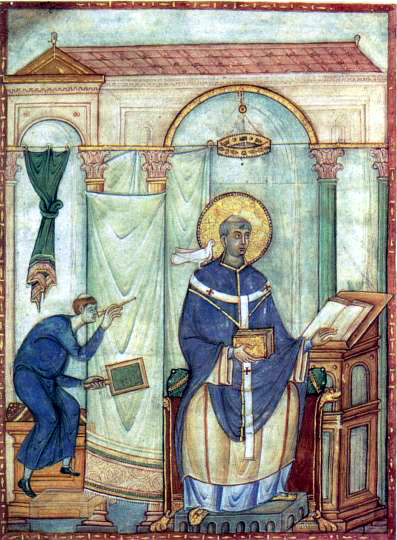
St. Gregory the Great alternately listens to the Holy Spirit revealing the chants to him and dictates them to a scribe. The Scribe, puzzled by the intermittent pauses in the Pope's dictation, has lowered his slate and is peeking from behind the screen.
To St. Gregory the Great chiefly belongs the honor of having collected and published the beautiful and chaste forms of liturgical prayer and those harmonious melodies called forever after him "Gregorian Chant"."The Gregorian Chant, says Pius X, possesses in the highest degree the qualities proper to the liturgy which are especially holiness and excellence of form, whence spontaneously springs another character, namely universality. Consequently the Gregorian Chant property belongs to the Roman Church; it is the only chant she has inherited from the ancient Fathers, which she has jealously guarded through the ages in her liturgical manuscripts, which she directly proposes to the faithful as her own, and which, in certain parts of the liturgy she prescribes exclusively. 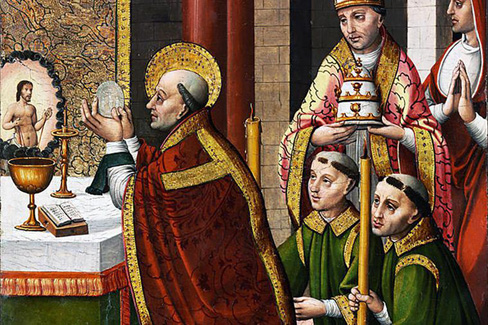
Fifteen Hymns found in the Roman Breviary were composed by St. Gregory. At this season, consecrated to penance, let us ask God, through the intercession of this Saint, to deliver us from the weight of our sins. ________________________________ Homily of St. Gregory, Pope Homily 16 on the Gospels
Some persons are accustomed to question by what Spirit Jesus was led into the desert, on account of the words a little farther on: Then the devil took Him into the holy city; And again: The devil took Him to a very high mountain. But without any question at all, it is appropriate to believe it was the Holy Spirit who led Him into the desert; His own Spirit led Him where the evil spirit would find Him and tempt Him. When, however it is said that He, God and man, was taken up by the devil into a very high mountain, or into the holy city, the mind shrinks from believing, and the ears of man dread to hear it. Yet we know that this is not incredible when we think what was done on other occasions.
Truly, the devil is the head of all the wicked: and all the wicked are members belonging to this head. Was not Pilate a member of the devil? Were not the Jews who persecuted Christ, members of the devil, and the soldiers who crucified Him? Why, then, should we wonder that He allowed Himself to be taken up into a mountain by the devil, by whose members He even allowed Himself to be crucified? Therefore, it was not unfitting that our Redeemer should will to be tempted, who came to be slain. It was, indeed, just that He should, by His own temptations overcome our temptations, even as He came to conquer our death by His own. But we ought to know that temptation passes through three stages: suggestion, pleasure in the temptation, and consent. And when we are tempted, we often experience pleasure in the temptation, or even give our consent; for we are conceived of sinful flesh, and in us we carry what is subject to attack. But God who took flesh in the womb of a Virgin, and came into the world without sin, allowed no contradiction within Himself. He could, then, be tempted by suggestion: but the pleasure of sin could never force its way into His mind. And therefore those temptations of the devil were external to Him, and were not from within. ________________________________ Quotes from St. Gregory the Great
The love of God insures the love of our neighbor, and the love of our
neighbor serves to keep alive the love of God.
They who voluntarily commit sin show a contempt for life eternal, since they willingly risk the loss of their soul. It avails nothing to subdue the body, if the mind allows itself to be controlled by anger. In the eyes of the sovereign Judge the merit of our actions depends on the motives which prompted them. It is in vain that we cut off the branches of evil, if we leave intact the root, which continually produces new ones. The more numerous the gifts we have received from God, the greater the account we must render to Him. He who fails to reflect before acting, walks with his eyes shut and advances with danger. He also falls very often, because the eye of reflection does not enable him to see whither his footsteps lead. As the branch separated from the roots soon loses all life and verdure, so it is with good works which are not united with charity. What we do for ourselves during life is more certain than all the good we expect others to do for us after death. Affliction strengthens the vigor of our soul, whereas happiness weakens it. 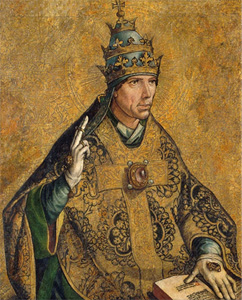 St. Gregory the Great Common of Doctors
R. Well done, good and faithful servant, because thou hast been faithful over a few things I will place thee over many things: Enter thou into the joy of the Lord.
V. Lord, thou didst deliver to me five talents: behold I have gained other five talents. Enter thou into the joy of the Lord. R. Behold a great priest, who in his days pleased God: Therefore by an oath the Lord made him increase among his people. V. He gave him the blessing of all nations, and confirmed his covenant upon his head. Therefore by an oath the Lord made him increase among his people. R. The Lord hath sworn, and will not repent: Thou art a priest forever according to the order of Melchisedech. V. The Lord said unto my Lord, sit thou at my right hand. Thou art a priest forever according to the order of Melchisedech. http://catholicharboroffaithandmorals.com/ |